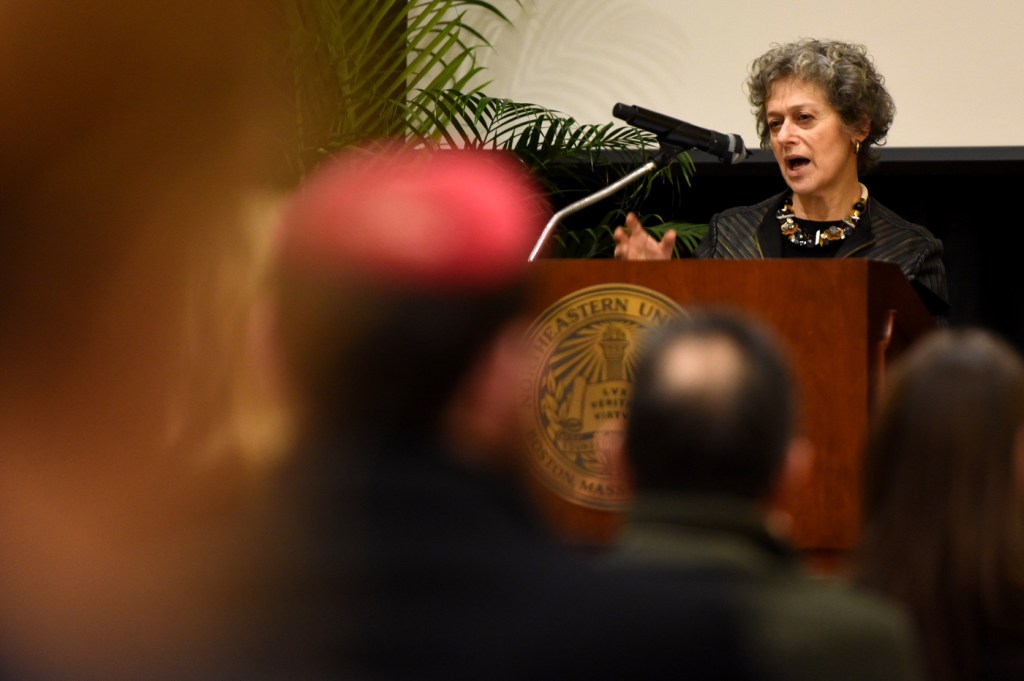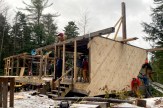Northeastern Holocaust Commemoration speakers contend with suffering, survival

When Rose Zoltek-Jick set out to write her keynote address for Monday’s Holocaust commemoration, she purposefully left herself out.
The Northeastern law professor soon found, however, that the address—titled “The Search for Meaning: Survivors’ Children and Their Choice of a Life in the Law”—was inextricably tied to her own life. A child of Holocaust survivors and a lawyer herself, Zoltek-Jick reflected on her initial choice, drawing comparison to her parents’ survival in Warsaw, “living as Christians with false papers.”
“Did I really think that I could give this talk and not reveal my identity?” Zoltek-Jick puzzled out during her lecture to a full crowd at the Cabral Center. “Apparently so, but in the days leading up to this talk, I realized what I had reproduced—my title was a title of false papers; I was afraid that the personal would muddy the academic.”
The event kicked off Northeastern’s annual commemoration of Holocaust Awareness Week. President Joseph E. Aoun opened the commemoration with a call to open Northeastern’s longstanding Holocaust Awareness Week events to the larger Boston community.
“In our society, we’re seeing a rise of exclusion,” he said. “For us, that’s totally unacceptable. But it’s not enough for us to have a microcosm where we assert that this is unacceptable. Our duty is to make sure it doesn’t happen anywhere.

“This is not just a scholarly week at Northeasten—though it will have a scholarly dimension—this is an invitation to every member of the community to stand, reaffirm those values, prevent discrimination, and work on stopping genocides that exist in the world as we speak,” Aoun said.
Zoltek-Jick, who is associate director of Northeastern’s Civil Rights and Restorative Justice Project said she and other children of Holocaust survivors constantly find themselves in “this dynamic of approach and avoidance”—a contradiction that also lives in her chosen profession of the law.
“It’s a constant struggle, and those who practice law know law is a double-edged sword,” she said. “At the heart of it is a dual consciousness about how law can be used: for the light of justice and the darkness of injustice.”
We as a cohort took the worst of the worst that history had to offer and we turned it into something generative in one generation—we were going to heal the world.
Rose Zoltek-Jick, Northeastern law professor
The most pertinent and most serious example of this duality lies in Nuremberg, Zoltek-Jick said. The word most often conjures up references to the Nuremberg trials—a series of military tribunals held by the Allied Forces after World War II during which prominent members of the Nazi leadership were prosecuted for their participation in the Holocaust and other war crimes.
A decade earlier, however, the Nuremberg Laws were passed at the annual Nuremberg Rally of the Nazi Party. The laws passed there “stripped away a different badge of citizenship and of humanity” from German Jews, Zoltek-Jick said.
“It’s impossible to face the law squarely and not see that one Nuremberg began another,” she said. “The law was the first instrument of Nazi power in war. Law is an empty vessel into which liberation and oppression can be poured.”
Zoltek-Jick was forced to reckon, then, with how she could dedicate her life to a practice that both liberated and historically disenfranchised her own parents.
She found the answer, partially, in a psychology journal that contained a reference to children of Holocaust survivors being overrepresented in helping professions. Though she didn’t, ultimately, find hard data to back up the claim, it still rang true.
“Not only was our existence a balm to their souls,” she said of her generation’s relation to their parents, “we as a cohort took the worst of the worst that history had to offer and we turned it into something generative in one generation—we were going to heal the world.”
She closed her remarks by urging all to be vigilant against new threats to humanity today—a sentiment that echoed Aoun’s earlier remarks.

Just as Zoltek-Jick reflected on the duality of the law, so too did Alison Campbell, SSH’17, this year’s Gideon Klein Scholar, who contemplated the ethical gray area inherent in some fields of photography.
Each year, the Gideon Klein Award supports a student exploring the work of a Jewish artist or musician persecuted by the Nazis. Scholars are asked to create an original work, prepare a performance, or do research. The award, which includes a $5,000 prize, honors the memory of Gideon Klein, a brilliant pianist and composer who was imprisoned in concentration camps until his death in 1945. Northeastern Distinguished Professor of Chemistry Bill Giessen, who grew up in Nazi Germany and died in 2010, established the award in 1997 in memory of his mother, Gustel Cormann Giessen.
Ruderman Professor of Jewish Studies Lori Lefkovitz, who directs the Humanities Center and the Jewish Studies program, said Campbell “is an exemplary Northeastern student in every way we encourage them to be.”
Campbell—a photographer herself who is pursuing a combined major in political science and international affairs, with a minor in urban studies—studied the work of Wilhelm Brasse. Brasse photographed extensively in Auschwitz and is known both for the identity photographs of the camp’s victims and his efforts to preserve tens of thousands of photographs and negatives upon the camp’s closure.
Campbell considered Brasse’s ethical imperative in comparison to her own, taking atrocity footage in Rwanda and studying Syrian refugees in Jordan.
Brasse’s images, Campbell said, memorialize “people the Nazis literally tried to erase. At the same time, the subjects had no choice in their participation in these photos. We as spectators, then, occupy tenuous ethical territory, and we must accept their judgment.”
In her own work, Brasse’s compassion and ability to offer some modicum of dignity to an otherwise dehumanizing act “will always be a benchmark for me,” Campbell said.
Holocaust Awareness Week is presented by the College of Social Sciences and Humanities and the Northeastern Humanities Center in conjunction with the Holocaust Awareness Committee.





